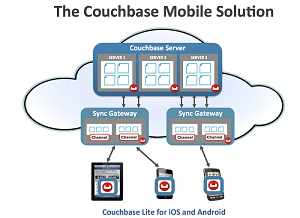Couchbase Lite for .NET in Beta
The owner of "the most complete NoSQL database" is targeting the Microsoft .NET Framework for a new open source release. Sound strange? Welcome to the new world of cross-platform interoperability. Developers write their code once and -- with some automatic optimization -- it will run on anything, anywhere, even leveraging native device functionality.
In this case, Couchbase Inc. has partnered with cross-platform kingpin Xamarin to put into beta a native Couchbase Lite for .NET database, "the world's first and only full-featured, flexible, mobile JSON database that runs locally on the device and is built from the ground up for mobile devices."
The two companies will work together to make the new embedded database targeting mobile users generally available this fall. They will also make the code portable, targeting iOS and Android through the Xamarin technology. And, of course, the .NET product will work on phones, tablets and desktops running Microsoft OSes.
 [Click on image for larger view.]
Now available for .NET apps, connected or not
[Click on image for larger view.]
Now available for .NET apps, connected or not
(source: Couchbase Inc.)
Couchbase Lite is now generally available in 1.0.0 releases for iOS, Android and Java, in both enterprise and free community editions. Couchbase also provides plug-in connectors for Xamarin and Adobe PhoneGap, another popular cross-platform development tool that uses HTML 5, CSS and JavaScript. The Xamarin approach differs from PhoneGap -- closely related to the open source project Apache Cordova -- in that developers write C# code that gets targeted for multiple platforms. Preview tooling support for Cordova was recently added to Visual Studio in the 2013 Update 2. Now, .NETdevelopers using Xamarin can more easily integrate the small-footprint database in their apps.
Couchbase is known for its Couchbase Server -- formerly called Membase -- a cloud-based JSON database for which it offers SDKs for programming in Java, Ruby, .NET, C, PHP and Python.
Couchbase Lite is combined with Sync Gateway under the newly available Couchbase Mobile umbrella to offer offline functionality for users on the go. Sync Gateway is used to synchronize data stored in the embedded Couchbase Lite database on a device with Couchbase Server when connectivity is available. Off-grid peer-to-peer support is provided through REST APIs.
"Our goal is to enable developers to build the next generation of mobile applications," said Couchbase exec Rahim Yaseen in a statement. "Xamarin has a community of more than 600,000 developers building native mobile apps for iOS, Android and Windows in C#. Building a native .NET version of Couchbase Lite gives that community a faster, easier way to handle mobile data synchronization, eliminating one of the biggest challenges to building always-available, always-responsive applications."
Coincidentally, a recent Visual Studio Magazine blog post by Keith Ward explored the notion of Microsoft buying Xamarin. That would make things really interesting, judging from the hundreds of social shares and a bunch of reader comments.
Posted by David Ramel on 05/22/2014